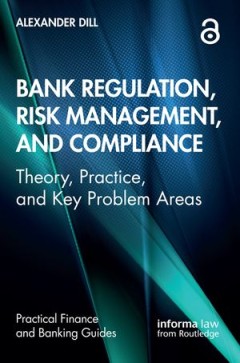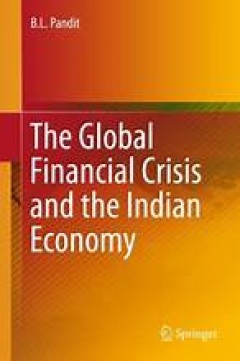Filter by

Financial Report 2022
In 2022, the Bank’s lending signatures amounted to €65.1 billion. This report includes the 2022 financial statements and audit reports both for the EIB and the EIB Group.
- Edition
- -
- ISBN/ISSN
- 9789286155079
- Collation
- -
- Series Title
- -
- Call Number
- 354

Assessing Relative Valuation in Equity Markets: Bridging Research and Practice
This book addresses the gap between the widespread use of stock market multiples in valuation practice and the frontiers of research on multiples. The book's approach is twofold: the authors first analyse the performance of multiples metrics in predicting the market price of a set of liquid and highly traded US stocks. The authors then employ these results to test profitable stock purchasing st…
- Edition
- Ed. 1
- ISBN/ISSN
- 978-1-137-56335-4
- Collation
- XIV, 180
- Series Title
- -
- Call Number
- 658.155 ROS a

Rent-Seeking in Private Pensions
This book argues that the implementation of compulsory, highly regulated, privately administered, defined contribution pensions facilitates rent-seeking behaviour on the part of the pension fund administrators and undermines the retirees’ income and well-being. While the book focuses primarily on Chile, its analysis and conclusions are applicable to several Latin American and Eastern European…
- Edition
- -
- ISBN/ISSN
- 978-1-137-58035-1
- Collation
- -
- Series Title
- -
- Call Number
- -

Explaining Financial Crises A Cyclical Approach
This book develops a new theoretical approach to the explanation of systemic financial crises in industrial and emerging market countries. In contrast to standard models, the present cyclical approach is consistent with the following three stylized facts. Firstly, systemic financial crises are a recurrent phenomenon generally accompanied by excessive boom-bust cycles. Secondly, the frequency of…
- Edition
- -
- ISBN/ISSN
- 9783631754375
- Collation
- -
- Series Title
- -
- Call Number
- -
Regulation A+: How the JOBS Act Creates Opportunities for Entrepreneurs and I…
Discover how to raise money under new provisions in the recently enacted JOBS Act. Regulation A+: How the JOBS Act Creates Opportunities for Entrepreneurs and Investors will guide and advise executives of emerging growth companies, entrepreneurs, financial advisers, venture capitalists, investment bankers, securities lawyers, finance and MBA students, and others on how to raise up to $50 millio…
- Edition
- -
- ISBN/ISSN
- -
- Collation
- -
- Series Title
- -
- Call Number
- -

Bank Regulation, Risk Management, and Compliance : Theory, Practice, and Key …
Bank Regulation, Risk Management, and Compliance is a concise yet comprehensive treatment of the primary areas of US banking regulation – micro-prudential, macroprudential, financial consumer protection, and AML/CFT regulation – and their associated risk management and compliance systems. The book’s focus is the US, but its prolific use of standards published by the Basel Committee on Ban…
- Edition
- -
- ISBN/ISSN
- 9781000702514
- Collation
- 340 halaman
- Series Title
- -
- Call Number
- 658 DIL b

International Financial Centres after the Global Financial Crisis and Brexit
This book gathers leading economic historians, geographers, and social scientists to focus on the developments in key international financial centres following the 2008 Global Financial Crisis and to consider the likely effects of Brexit on these centres. Eleven centres in eight countries are taken into consideration: New York, London, Frankfurt, Paris, Zurich/Geneva, Hong Kong/Shanghai/Beijing…
- Edition
- -
- ISBN/ISSN
- 9780198817314
- Collation
- -
- Series Title
- -
- Call Number
- -

The Global Financial Crisis and the Indian Economy
After tracing the causes of the global financial crisis, the book focuses on two fundamental systemic issues connected with its manifestation: financial-sector regulation and the problem of the dollar-centric international monetary system, both of which have been widely cited among the important factors leading to the 2008 financial crisis. The important analytical question of monetary policy t…
- Edition
- 1
- ISBN/ISSN
- 978-81-322-2395-5
- Collation
- XI, 142, 31 b/w illustrations
- Series Title
- -
- Call Number
- -

The Financial Crisis
This book brings together a good mix of academics and practitioners for a discussion that focuses on how to change financial practice and the academic field of finance in order to understand the current financial crisis and deal with future turbulent financial times. The volume is based on contributions by prominent academics and practitioners from Europe, Asia and the USA. The book contains se…
- Edition
- 1
- ISBN/ISSN
- 978-3-319-20588-5
- Collation
- XI, 175, 3 b/w illustrations, 22 illustrations in colour
- Series Title
- -
- Call Number
- -

Transforming Payment Systems in Europe
The European payment market has undergone rapid transformation in recent years due to changes in payment habits, new business rules and new legal frameworks and regulation. There has also been an advent of new technologies and payment solutions which has altered the European payments landscape drastically. This book provides an overview of the fundamental issues involved in this new payments…
- Edition
- -
- ISBN/ISSN
- 978-1-137-54121-5
- Collation
- -
- Series Title
- -
- Call Number
- -
 Computer Science, Information & General Works
Computer Science, Information & General Works  Philosophy & Psychology
Philosophy & Psychology  Religion
Religion  Social Sciences
Social Sciences  Language
Language  Pure Science
Pure Science  Applied Sciences
Applied Sciences  Art & Recreation
Art & Recreation  Literature
Literature  History & Geography
History & Geography